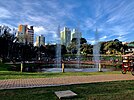Passo Fundo | |
|---|---|
| Municipality of Passo Fundo | |
| Nickname(s): Capital of the mid-Plateau, Land of the Good Folks | |
| Motto(s): Work, Brotherhood, Progress! | |
 Location in Rio Grande do Sul | |
| Coordinates: 28°15′S 52°24′W / 28.250°S 52.400°W | |
| Country | |
| Region | South |
| State | |
| Founded | 1827 |
| Incorporated | 1857 |
| Government | |
| • Mayor | Pedro Cezar de Almeida Neto [1] |
| Area | |
| • Total | 758.27 km2 (292.77 sq mi) |
| Elevation | 687 m (2,254 ft) |
| Population (2020)[2] | |
| • Total | 204,722 |
| • Density | 241/km2 (620/sq mi) |
| Time zone | UTC−3 (BRT) |
| HDI (2010) | 0.776 – high[3] |
| Website | pmpf |
Passo Fundo is a municipality in the north of the southern Brazilian state of Rio Grande do Sul. It is named after its river. It's the tenth largest city in the state with an estimated population of 204,722 inhabitants living in a total municipal area of 780 km2.
Passo Fundo is a city well known because of the singer, composer and filmmaker Vitor Mateus Teixeira, better known as Teixeirinha, he was born in the city of Rolante in Rio Grande do Sul, and adopted the city of Passo Fundo as his own, the singer liked a lot from the city, in 1960 he composed the song "Gaúcho de Passo Fundo", which was very successful and made Passo Fundo become a known city throughout Brazil. Teixeirinha composed two more songs in homage to the city of Passo Fundo, they are "Saudades de Passo Fundo" (1963) and "Passo Fundo do Coração" (1973), as well as producing and starring in a film set in the city, a film called "O Gaucho de Passo Fundo", released in 1978.
- ^ Regional Electoral Court's 2020 election results
- ^ IBGE 2020
- ^ "Archived copy" (PDF). United Nations Development Programme (UNDP). Archived from the original (PDF) on July 8, 2014. Retrieved August 1, 2013.
{{cite web}}: CS1 maint: archived copy as title (link)






